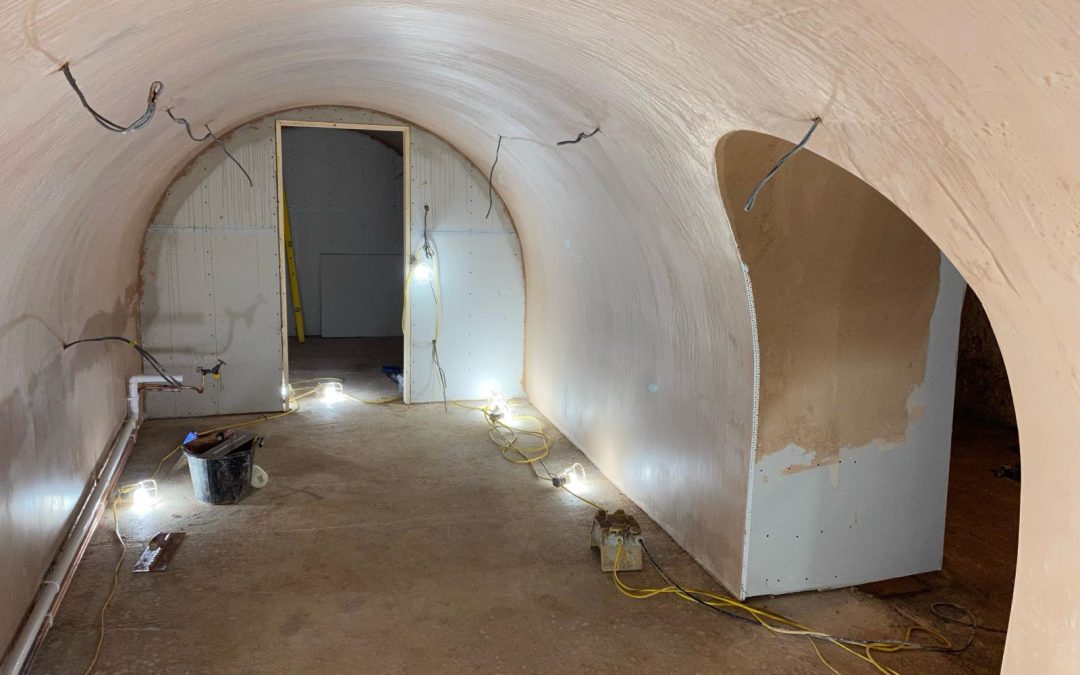At Cannon Clarke, one of the most common enquiries we receive is about basement waterproofing.
Whether you’re converting a cellar into a living space, protecting valuable storage or simply worried about damp walls, basement waterproofing is essential to keep your property dry and structurally sound.
Did you know? According to Shelter (Oct 2021 report), 26% of renters in England are affected by damp and mould issues, and one in five report their health is being harmed by poor conditions. Left untreated, this can cause structural damage, mould growth, and even reduce the value of your property.
In this guide, we’ve answered the most common questions we get asked about basement waterproofing, from what it is and how it works, to the best methods and long term solutions.
1. What is Basement Waterproofing?
Basement waterproofing is the process of preventing water from entering a below-ground space. Because basements are often surrounded by soil and subject to hydrostatic pressure (water pressing against the walls and floor), they’re at high risk of leaks, damp, and mould.
Structural waterproofing creates a protective barrier, ensuring your basement stays dry, usable, and safe, whether for storage or as a habitable room.
2. How is Basement Waterproofing Done?
There are several professional methods for waterproofing a basement. The right solution depends on the building’s structure, condition, and intended use of the space. Common techniques include:
- Cavity Drain Membranes (CDM): A studded plastic membrane is fitted to walls and floors, allowing water to drain into a sump and pump system. Tanking membranes are one of the most popular and reliable methods.
- Basement Tanking (Cementitious Waterproofing): A specialist coating is applied directly to walls and floors, blocking water from penetrating the structure.
- External Waterproofing: Applying barriers and drainage solutions to the outside of basement walls to stop water reaching them in the first place.
At Cannon Clarke, we assess each property individually and recommend the most effective method.
3. How Does Basement Waterproofing Work?
Waterproofing works by either blocking water at the point of entry (e.g. tanking) or by redirecting it safely away (e.g. cavity drainage).
A well-designed system will:
- Stop moisture and water ingress
- Protect the structural integrity of the building
- Prevent mould and damp damage
- Make the space suitable for everyday use
If you’re already experiencing damp issues in your home, we’ve answered common damp proofing questions for our professional advice or get in touch to speak to an expert today.
4. What is the Best Basement Waterproofing Method?
There’s no ‘one-size-fits-all’ answer, the best method depends on your property.
- For habitable spaces (home gyms, offices, living areas), cavity drain membranes are often the preferred solution due to their reliability and maintainability.
- For smaller or storage-only basements, tanking may be suitable.
- For new builds or external projects, external membranes and cavity drainage systems are highly effective.
The key is a tailored solution which is dependent on the use of the room. That’s why we always recommend a professional survey before making any decisions.
5. How Long Does Basement Waterproofing Last?
A properly installed waterproofing system can last for decades.
Factors affecting lifespan include:
- Quality of installation
- Type of waterproofing system used
- Ongoing maintenance and servicing (particularly pumps in cavity drainage systems)
At Cannon Clarke, we use proven, long-lasting systems and provide guidance on aftercare to keep your basement dry for years to come.
6. What Are Signs My Basement Needs Waterproofing?
Look out for:
- Damp patches or water stains on walls/floors
- A musty smell or visible mould
- Efflorescence (white, powdery salts on walls)
- Peeling paint or plaster
- Standing water after heavy rainfall
If damp is already affecting timbers or joists, it’s important to check for potential wet rot or dry rot.
7. Can a Damp Basement Affect Upstairs?
Yes, moisture rarely stays contained in one area and can rise.
A damp basement can lead to:
- Condensation and mould spreading upstairs
- Damage to timber joists and flooring above
- Poor air quality throughout the property
That’s why waterproofing your basement is not just about the basement itself, it’s about protecting the whole building.
Structural repairs are often necessary to address damage caused by long-term damp issues.
8. Do I Need Basement Waterproofing If I Don’t Use The Space
Even if your basement is just for storage, waterproofing is worthwhile. A damp basement can damage stored belongings, weaken the building’s foundations, and cause problems elsewhere in the property.
Think of it as safeguarding your investment and preventing future issues.
9. Can I Waterproof My Basement Myself?
DIY solutions like sealants and paints may provide short-term relief, but they often don’t tackle the underlying issue.
Professional waterproofing ensures your basement is protected properly and backed by specialist expertise. The best way to fix damp issues is to find the root of the problem and fix them for long term and cost effective results. Let our team help save you time and money!
Still Have Questions? Let’s talk!
Basement waterproofing can feel overwhelming, but you don’t have to tackle it alone. At Cannon Clarke, our certified surveyors bring over 30 years of experience in diagnosing and solving basement damp issues.
We’ll recommend the most effective, long-lasting solution tailored to your property.
Book a survey today and protect your home or business for the future.


